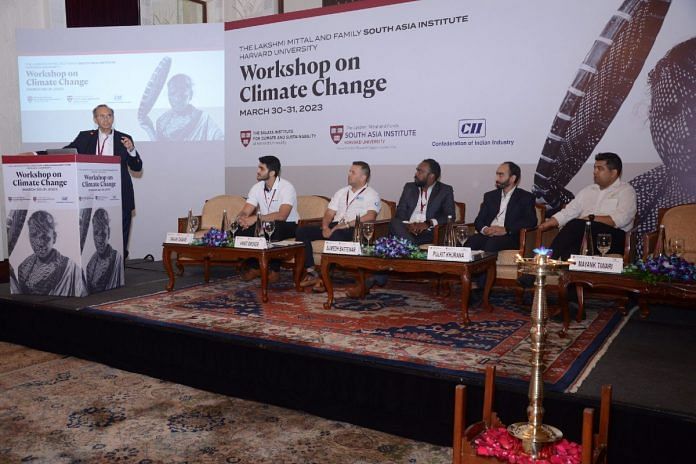New Delhi: The Lakshmi Mittal and Family South Asia Institute at Harvard University launched the Harvard Mittal Climate Platform here Friday, following a two-day workshop on climate change it held with government officials, researchers, policymakers, and civil society organisations.
The Platform seeks to focus on adaptive measures in South Asia to improve climate resilience, initially focussing on heatwaves and floods in India and Bangladesh, said Satchit Balsari, assistant professor in Emergency Medicine at Harvard Medical School, during the event.
“We’re very comfortable putting together groups that have in the past already worked across the sciences and the arts. And we would like to sort of leverage that,” he said, adding that the Platform will engage with the subject of climate adaptation “primarily through large research projects”, while encouraging the exchange of scholarship.
The workshop, co-sponsored by the Salata Institute for Climate and Sustainability at Harvard and the Confederation of Indian Industries, featured themed panel discussions on India’s energy transition, flooding, and heatwaves.
The workshop comes at a time when India is anticipating higher than normal temperatures through the summer months. Last year, the country’s heatwaves were found to be 30-100 times more likely because of the effects of climate change, according to an analysis by the UK Met office.
On India’s energy transition
The workshop was attended by Tarun Kapoor, adviser to the Prime Minister’s Office, V. K. Saraswat, scientist with the NITI Aayog, Reema Nanavaty, general secretary of the Self Employed Women’s Association (SEWA), Daniel Schrag, the Sturgis Hooper professor of geology at Harvard, among others.
Kapoor said that while India had made progress in its energy transition, several challenges remain for which answers are sought. Among them are efficient energy sources for trucks, public transport, and alternatives for heavy industries like steel and cement.
“Generating renewable energy is not a problem now, but managing the grid is,” he said, adding, “This is one area that requires innovation, and where we need answers.”
Nanavaty said that for adaptive efforts to be successful, it was necessary to “improve resilience of women workers, workers’ organisations, and resilience of existing policies”.
“It’s really about poor countries, viewing the demand for green products in rich countries as a growth opportunity. India will develop green manufacturing because there are markets in Germany and the US and Japan that will gladly pay extra for them. And I think that’s an incredible opportunity,” said Schrag.
The platform will be led by Tarun Khanna, director of the Lakshmi Mittal and Family South Asia Institute, as well as Balsari and Schrag.



